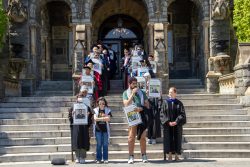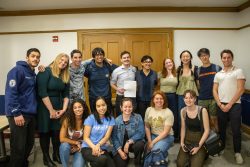On Wednesday night, the Georgetown University Student Association Senate released a final draft proposal for the Student Activities Fee and Endowment Reform legislation, including the exact proposed increase in fees.
Since its creation in 2001, half of the Student Activities Fee has gone to student activities and the other half has gone to the Student Activities Fee Endowment.
The legislation, which will be subject to a student referendum if it passes the full Senate, also proposes raising the Student Activities Fee from $100 to $125 for the 2011-12 academic year, and raising it to $150 in the 2012-13 school year. Afterwards, the $150 Student Activities Fee would increase with inflation.
According to the FinApp Committee, $850,000 will be available for allocation to student groups during the 2011-12 school year, and approximately $1 million will be available for each following year. Due to current budget constraints, GUSA was able to allocate only $363,000 of the $435,500 requested by the advisory boards during the 2009-2010 academic year, according to Greg Laverriere (COL ’12), the Chair of the FinApp Committee.
Adam Mortillaro (COL’12), the speaker of the GUSA Senate, said that the numbers still did not show the full picture.
“There is a substantial gap between what the groups want and what they request,” Mortillaro said. “They’re not going to ask for half a million dollars if we only have $380,000, so they ask for what they can under the circumstances.”
Laverriere noted that Club Sports was particularly underfunded, even after GUSA gave the organization $115,000 of the $150,000 it requested.
“The school couldn’t even replace some of the soccer nets and other basic equipment, and club sports had to pay for things like that themselves,” Laverriere said.
Leaders of some student organizations, though, have said that they have no need for additional funding.
Mia Di Stefano (COL ’12), treasurer for United Feminists, said that the number of events the group plans each year depends largely on the motivation of the students involved.
“I don’t think we’ll see much of an effect from $25 being added to every student’s bill,” Di Stefano said. “Generally, I’m against raising my tuition in any way, shape or form.”
Other organizations said that the increase will not have a large impact on their activities.
“While an increase in the Student Activities Fee does increase the overall funding the Media Board has access to … we have never encountered funding issues due to a lack of Center of Student Programming funds in the past,” Allison Wilkinson (COL ’11), editor for the Anthem, Georgetown’s literary magazine, wrote in an email.
“We’ve never had trouble getting events. I don’t think it’s necessarily a great thing that they’re charging students more. I think $25 dollars here and $50 there might go a long way,” Joe Knowles (COL ‘13), a member of College Republicans, said. “It might help some of the other clubs … we’re pretty much covered [except] a ten dollar fee here and there.”
The FinApp Committee decided on the $25 increase for the next academic year after talking with the Center for Social Justice, Club Sports, the Student Activities Commission, and other advisory boards.
Laverriere said that he has also been speaking with University administrators to discuss the referendum and to ensure support from administrators if it passes.
Extra funds from the Student Activities Fee could also affect activities outside the purview of advisory boards. Colton Malkerson (COL ‘13), a member of the FinApp Committee, said the additional funding could help pay for things like the Collegiate Readership program, room fees for clubs, weekend GUTS bus funding, and other initiatives.
Malkerson said that the FinApp Committee originally planned to only change the percent of the current fee allocated to student activities instead of the endowment. But the Committee saw the reform as an opportunity to make more lasting changes.
“There’s not often a referendum like this, and it’s not often you have momentum and interest in the topic,” Malkerson said. “Now is the time to make [these changes]. It might be a number of years before the issue is addressed again.”





